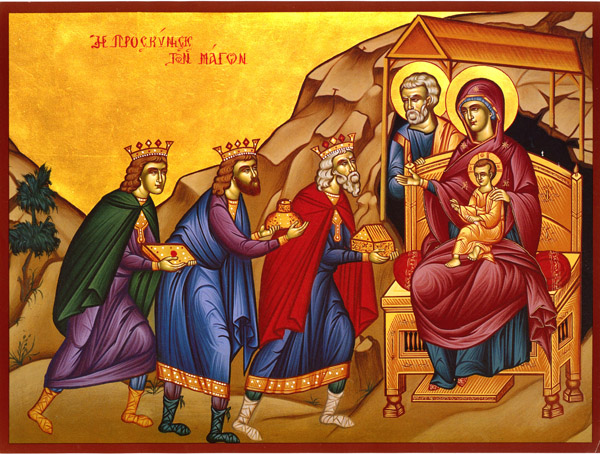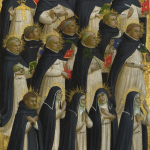My first Christmas as a Catholic followed swiftly on the heels of my conversion, and I was already arranging flights for interviews for my California job before the season was over, so, this year, I’ve appreciated getting to experience more of the feasts that come thick and fast after December 25th. This past Monday was the Feast of the Epiphany which celebrates the revelation of God as Man and whose readings focus on the visitation by the Magi. Naturally, at Mass, we sang “We Three Kings,” which wasn’t a hymn I’d heard much before, and I’m not sure I had ever heard anyone get up to the stark fourth verse.
Myrrh is mine, its bitter perfume
Breathes a life of gathering gloom;
Sorrowing, sighing, bleeding, dying,
Sealed in the stone cold tomb.
The three gifts brought by the kings honor Christ as King (gold), God (frankincense), and sacrifice (myrrh). When I listened to the song and to the readings for the day, I kept reflecting on the way that the gifts of the Magi bound all three aspects of Christ together for us. It seemed like a kind of synesthesia, where one sensory experience triggers another, even if they don’t, on first glance, seem bound together.
After the revelation of Christ the King, there is always a faint, uncanny valley tang of wrongness about too much respect for temporal power. When we see the gold of the crown on the head of a sovereign or all the pomp that surrounds a head of state, we’re struck by a sense that something is missing. The glittering trappings of power are a little too heady and aggressive, without the bitterness of myrrh and the reminder of how our leader suffers with us to ground them. And, absent that other scent, the reverence of frankincense seems out of place. When we indulge an unhealthy appetite for an authority that does not die out of love for us, the worshipful perfume of frankincense seems syrupy and overdone.
When Christ is revealed as God, the frankincense follows naturally, but the earth resin of myrhh reminds us that we aren’t just worshipping a Divine Geometer or Watchmaker. We worship a God that came down and lived and died with us, so that we would have the chance to be freed from the slavery of death, and so that even though our minds cannot contain an infinite God, we have enough of a lodestar to be able to know where to direct our prayers for help. God-become-Man helps translate the glory of God into a dialect of experience we’re relatively familiar with. And thus, once we know God in our frame of reference, we offer him gold. Superfluous, certainly, but it’s our way of replying in the native tongue of our other, secular relationships.
When Christ is revealed as someone who loves us unto death, the scent of myrhh conjures up all other times we have mourned. But now, that funereal scent is yoked to gold and frankincense. No matter how deep our despair, there’s a glint of light off of a crown and a tendril of smoke from a joyful altar. After Christ is revealed to us, myrhh never comes to us alone, but is accompanied by a promise of a power that loves us and hopes to see that love returned.













